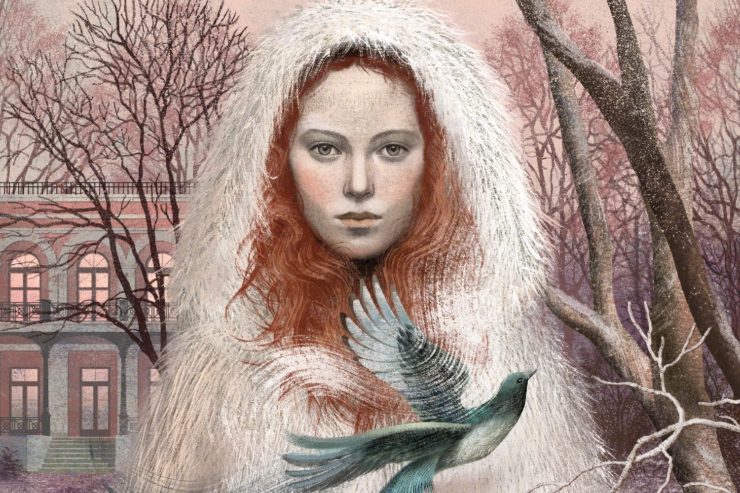There’s a certain fascination with Central and Eastern European cultures that extends beyond those who were born into those cultures and scholars who specialize in Slavic studies. Since I myself belong to the two latter categories, I cannot cast aside my personal and scholarly experience and see our legacies and cultures from a fresh perspective, the way foreign authors can and often do. But what I can do is analyse their approach to representation and compare it to ours.
New variations on Slavic themes provide us with a unique opportunity to see how the rest of the world reflects upon us and our centuries of folklore and literary traditions. Sometimes, it’s an eye-opening experience. But above all, it is an opportunity for our often ignored, stereotyped, and misinterpreted cultures to receive attention and (re)consideration from a new audience of readers and fans.
Foreign authors have two key advantages that many Central/Eastern European writers lack: they usually write in English, and they do not carry our complicated baggage of competing nationalisms, mutual animosities, and experiences of marginalization: An outsider cannot be as easily accused of being biased and favouring one Slavic nation over the other, and isn’t likely to be labelled a Polish/Serbian/Russian nationalist. Above all, foreign writers can bring a fresher perspective. Free from the strictures of our cultural and linguistic backgrounds, they interpret our cultures in ways that might be unexpected to us. Sometimes funny. Sometimes flattering. Sometimes inaccurate. Always intriguing.
Most Slavic-inspired novels by non-Slavic authors fall into two categories. First are fantasy narratives with a clearly identifiable source of inspiration, focused around a fictionalized version or counterpart of an existing culture (e.g. a fantasy version of Russia during the Great October Revolution with slightly altered names of the important historical players, who perhaps turn out to be mages or encounter other magical elements). In the second category are stories that take a combinatory approach, referencing a plethora of epochs and locations, most of which are identifiably Slavic, but are difficult to place (Polish-Lithuanian Commonwealth meets 20th-century Bulgaria meets steampunk). The second approach is more prevalent due to the difficulties associated with the complex historical and linguistic research required to craft a believable version of Russia, Poland, or the Balkans. When authors borrow reinterpreted elements from Slavic cultures in building their fantasy worlds, they can get away with inaccurate linguistics and history and loose or inexact interpretations of our cultural practices and sensibilities. If the internal worldbuilding is consistent, the lack of strict historical accuracy can be eclipsed by interesting plot twists, promising characters, and an overall fascination with their source of inspiration.
A View from Across the Borders
Not every novel containing references to Slavic cultures can be considered “Slavic-inspired.” For example, China Miéville’s use of the vodyanoy dockworkers in Perdido Street Station is intended to broaden the specific world of his novel, not to explore and reflect on the larger world of Slavic folklore. On the other hand, the vodnik character in Miloš Urban’s Hastrman is an author’s exploration of his own cultural heritage and the challenges it faces. Neither of the works are pure contemporary fantasies, but both are inspired by Slavic myths. The difference lies in the context and perspective.
Even after a fair amount of research, there are certain elements that might clue readers in to an author’s cultural background and level of familiarity with their setting. A Russian or a Bulgarian writer will tend not forget that many Slavic surnames are gendered (for example, Milena Zlatarska/Boris Zlatarski, Olga Grekova/Igor Grekov) and will frequently insert references to our classical literatures, popular culture, and familiar aspects of our day-to-day lives throughout their work. Authors writing from outside of the culture are often more focused on creating an original atmosphere than in positioning their works within the existing cultural context in a hyper-realistic way. Aspects of the Slavic past and present have always inspired writers of fantasy and science fiction, and that interest has certainly been justified—after all, vampires do come from Eastern European folklore. And Bram Stoker was one of the first foreign writers to produce a fantasy novel inspired by Romanian, Hungarian, and Bulgarian legends.
Nowadays, Slavic elements are mostly associated with Russia or the Balkans; fewer contemporary authors search for their inspiration in Romania or Hungary. When they find it, their works usually revolve around two most famous Romanian and Hungarian historical ‘undead’ figures—Erzsébet Báthory and Vlad Țepeș Dracula—who continue to provide an endless source of inspiration for fantasy writers across the globe. Not that you should expect a fully accurate representation of Slavic, Romanian, and Hungarian cultures in those works, but such accuracy isn’t really necessary—these fictional works are not, after all, meant to be read as factual, and it’s certainly possible to awaken new interest in Slavic cultures without an advanced degree in Slavic studies.
Leigh Bardugo’s Grisha Trilogy, for example, departs in many ways from its real-world inspirations, which are rooted in the turbulent 19th-century Russian Empire. Most Slavic-speakers would find Ravkan toponyms and naming conventions strange and inconsistent at best, but the author’s freewheeling interpretation of Slavic grammar and Russian History does not influence the plot of the story in any consequential way. Perhaps the name of the dark and mysterious antagonist sounds dramatic to a Western reader, while for us Eastern Europeans, it is wrongly gendered and comes across as unintentionally comedic (somewhat akin to calling a serious, conflicted Byronic hero and mage “Fluffy Sparks”). These slight inaccuracies do not bother the loyal fanbase of the series, nonetheless—and if the trilogy inspires readers to explore the sources of inspiration behind the story, then it’s all to the good. After all, there are very few fantasy novels in English that address Slavic cultures at all (and even fewer that are as popular as the Grisha books).
The overwhelming majority of these authors tend to opt for epic fantasy or folklore-inspired stories, ignoring urban or contemporary settings. The specificity required to write a write a believable urban fantasy in an unfamiliar culture with unfamiliar languages and national sensitivities and tensions makes for a daunting prospect. On the other hand, low and/or high fantasy allows non-Slavic authors to relinquish certain realistic constraints in their work, while retaining the ability to examine and challenge stereotypes from the outside. Even if the representation is not altogether perfect, engaged and respectful attempts to explore Central and Eastern European history and culture are a positive sign. In an age where nationalism and isolationism are on the rise all over the world, fantasy fiction affords us an opportunity to understand characters that do not share our views and backgrounds better than ever before.
Such books serve a valuable purpose. They expand readers’ perspective and capacity for empathy by creating characters and stories that are both relatable and unexpected. Slavic cultures and histories have a lot to offer—not only to those of us who are part of these communities, but to the rest of the world, as well. And sometimes it is refreshing to see writers and artists from other countries weaving our culture and past into their stories, even if their expertise is not always perfect. After all, fantasy as a genre allows for greater freedom and imagination in so many ways. The lack of available translations prevents me from including many interesting works not available in English on the following list of recommendations, but I hope you’ll enjoy this selection of Slavic-inspired novels, all written in English by Western authors…
Where to Start Reading
Winternight Trilogy—Katherine Arden
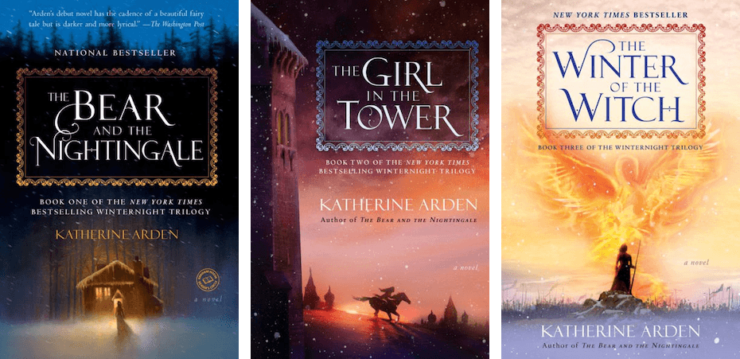
Buy the Book


The Bear and the Nightingale
A young adult fairy tale based in Russian folklore and medieval history, this trilogy offers a linguistically accurate representation of an alternate Russia where creatures of legend come to life and influence the world of the protagonist. It’s the story of a young girl from a wealthy family who is forced to fight for her right to choose her destiny, richly overlaid with mysticism and magic. Resisting the will of her harsh stepmother, Vasilisa conceals a dangerous gift, one that is considered witchcraft by devout believers—she can communicate with spirits and understands their ways. Moreover, as you may expect from any dark fairy tale, there’s a threat lurking in the woods…a threat more dangerous than anything Vasilisa can imagine.
Uprooted—Naomi Novik
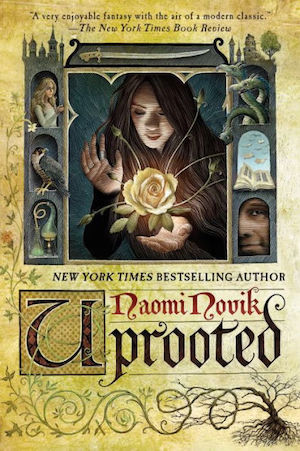
Buy the Book


Uprooted
Inspired by Polish folklore and Poland’s difficult relationship with the Russian Empire during the 19th century, this book is a fairy tale that is very loosely based on one of the most exciting periods in Eastern European history, a time in which the stories of real-life politicians, revolutionaries, and artists were so epic and grandiose that they almost eclipse fantasy. Uprooted follows a girl named Agnieszka who is abducted by the Dragon, a dark wizard. Keeping the mysterious powers of the corrupted Wood at bay, he also holds unexpected secrets that are linked to the destiny of Agnieszka’s country and her friends.
Deathless—Catherynne M. Valente
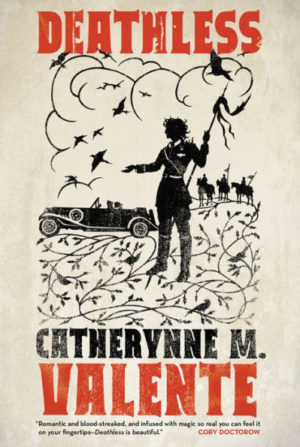
Buy the Book


Deathless
Koschei the Deathless is a popular character in Russian fairy tales—a wicked warlock who kidnaps princesses and tricks princes, while hiding away the secret of his immortality. Eventually, the brave hero discovers the secret, saves the day, and marries the princess… Only Deathless is not this story. It is a tale about Marya Morevna growing during the Russian Revolution, about household spirits in Stalinist shared apartments, about Koschei plagued by an unfortunate love that will be his undoing, and about life during communism. Combining the supernatural and the Soviet, the historical and the mythical, this book is, perhaps, best compared to the classic The Master and Margarita. It is, in essence, a dark fairy tale for adults that treats the Russian experience and cultural sensibilities with utmost respect.
The Grisha Trilogy—Leigh Bardugo
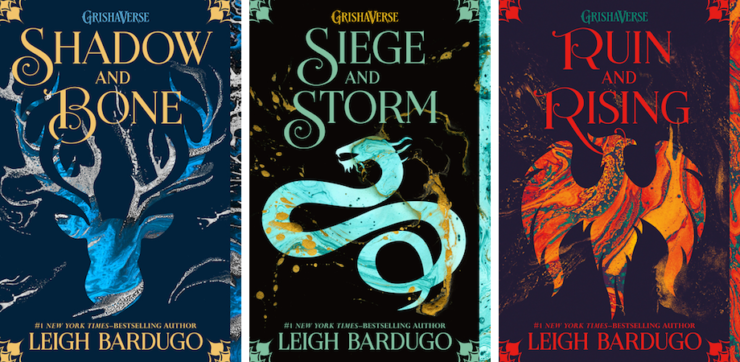
Buy the Book


Shadow and Bone
Alina’s magical gift may be the salvation of her country from the uncanny Shadow Fold—a swath of darkness inhabited by monsters, dividing Ravka into two halves. Now part of the magical elite led by the mysterious Darkling, Alina navigates politics and tries to solve mysteries that may explain the nature of her power and ensure the survival of her country. The trilogy is far from an accurate representation of Russian history and culture, but if you want to enjoy a captivating story in a pseudo-19th-century setting with a conflicted, compelling antagonist, it is well worth your time. And these books will, undoubtedly, motivate readers to learn more about the fascinating culture of the real Russia that inspired Bardugo’s fictional world.
Wicked Saints—Emily Duncan
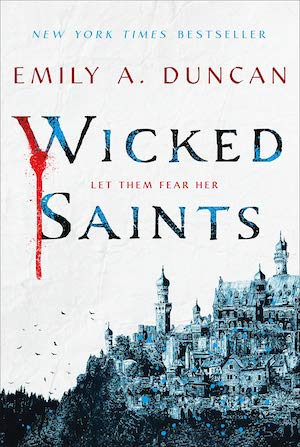
Buy the Book


Wicked Saints
Darker and edgier than The Grisha Trilogy, the world of Wicked Saints is inspired by Poland and Russia in the long 19th century (perhaps the two most beloved settings for Western authors writing about Eastern Europe). Nadya is a cleric from Kalyazin, who has a power to communicate with gods. She is also her country’s best weapon against a rival state planning to expand its borders (hm…sounds a bit like the partitions of Poland, perhaps?). When Tranavian forces attack Nadya’s monastery, she is forced to flee from enemy soldiers, while helping her Gods to retain their hold on the world. It is a dark fantasy that twists Eastern Orthodoxy, Slavic myths, and the pre-World War I aesthetics into a narrative about war and romance. Since the book falls into the young adult category, it focuses more heavily on the psychological struggles of its young protagonist than on political intrigue or cultural representation.
Tsarina—J. Nelle Patrick
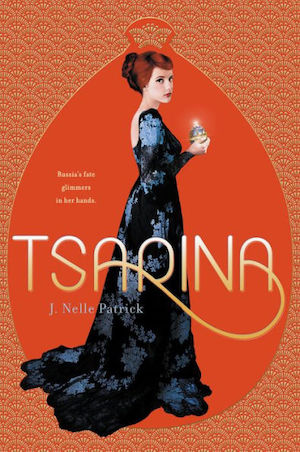
Buy the Book


Tsarina
Few settings are more tumultuous, controversial, and fascinating than the turbulent Russian Empire of the 1910s. If this novel reminds you a bit of the 1997 animated film Anastasia, with its catchy songs and gossamer dresses, there’s certainly a bit of overlap, here. In an alternate version of Russia on the eve of the revolution, Natalya is searching for a magical Fabergé egg concealing great powers while also falling in love with Alexei Romanov (and, no, he is not a twelve-year-old sickly kid, but a charmingly roguish young man instead). A young adult fantasy about the Russian Revolution with reflections on Russian heritage and culture, the action is rather loosely and superficially inspired by reality—for a reader familiar with this period, the story is riddled with historical inaccuracies (St. Petersburg, for example, should be called Petrograd in the novel, but it is not). Still, I would not write it off simply for its lack of realism: Tsarina is a magical romance in an unexpected setting that does not promise historical analysis, but offers a glamorous fantasy version of imperial Russia instead. If elegant Art Nouveau courts stir your fantasy more than exploring the darker, bloody political realities of the period, you might consider adding this to your reading list.
The Waning Moon Duology—Leena Likitalo
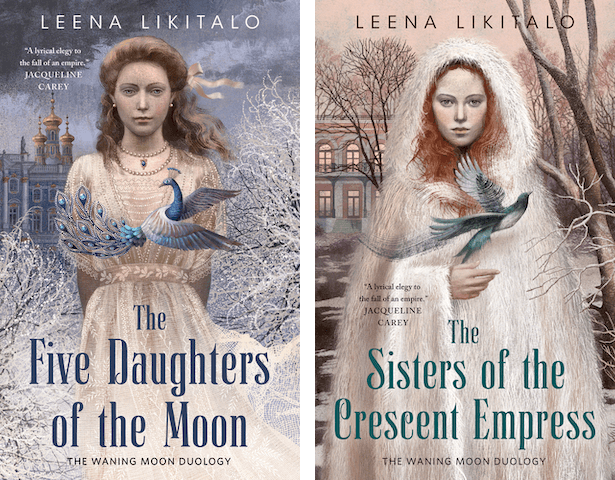
Buy the Book


The Five Daughters of the Moon
Inspired by the lives of the Romanov sisters, these novels take place in a pseudo-Russian setting infused with dark magic and technology. The Crescent Empire is on the verge of collapse when Gagargi Prataslav offers the Empress a controversial solution to growing political turmoil and economic crisis: a machine that runs on human souls. Wedded to the moon, the Empress has five daughters, who slowly begin to unravel the nefarious plan of the pseudo-Rasputin Prataslav (who is depicted as unambiguously evil). Told from the perspectives of the five sisters, this story offers a Slavic version of a steampunk novel, with the vibe similar to the Dishonored video game and aesthetics reminiscent of Amazon’s Carnival Row. Unbound by historical reality, these novels inspire and fascinate, although they may seem somewhat simplistic to more demanding lovers of elaborate intrigue and artful dodging.
The Russian Stories—C.J. Cherryh
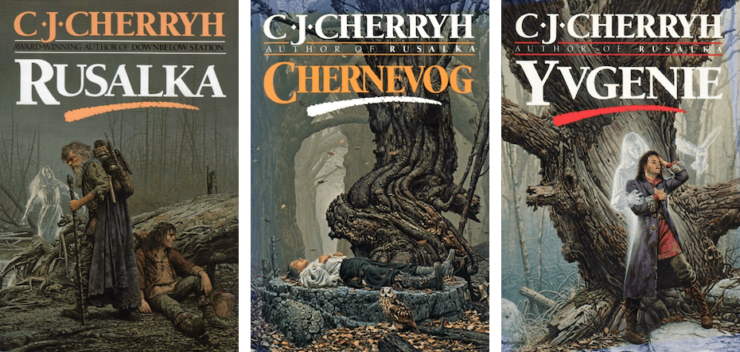
These three books paint a fantasy world based on Slavic folklore that is reminiscent of a traditional Western Fantasy, but creates a unique magical atmosphere, filled with dark legends about pagan gods who expand their powers, drowned maidens who yearn for love, and wicked spirits hiding in the woods. The first book follows a young wizard and a gambler who embark on an adventure together. The lives of the companions change forever once they meet a wraith-like beauty—a dead rusalka—and her elderly father, a brilliant wizard. It is a dark love story shrouded in myth. All three books feature wizards and explore the unexpected power of wishes, deep woods inhabited by magical spirits and everything else that you’d come to expect from a fantasy version of the pre-Christian Russia, Belarus, or Ukraine. All in all, Cherryh’s trilogy is bound to awaken readers’ curiosity and further interest in Slavic cultures and stories.
Teo Bileta is a social historian who focuses on Central and Eastern Europe in her studies. She also plays strategic boardgames and analyzes genre fiction from a historian’s perspective. She is currently based in Budapest.










